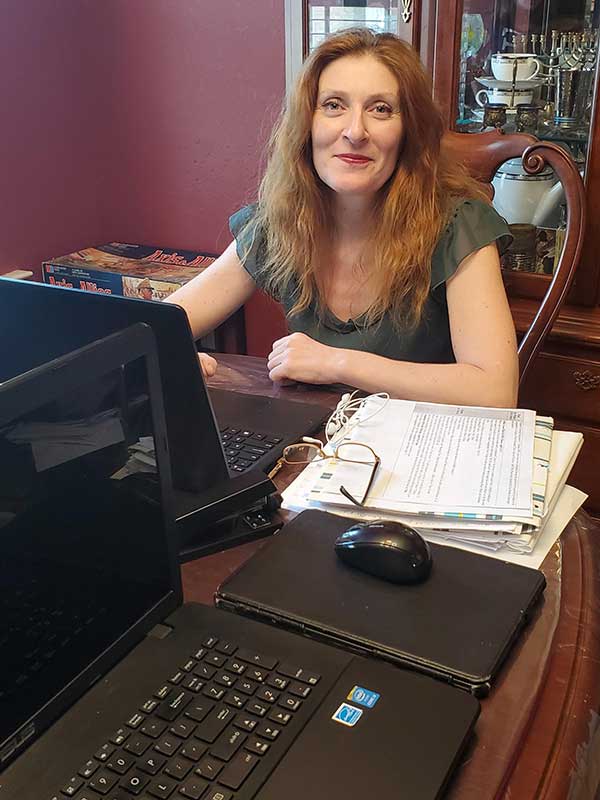Adapting to the Online Class Shift: One MGA Professor’s Story
Author: News Bureau
Posted: Thursday, April 16, 2020 12:00 AM
Categories:
School of Arts and Letters | Pressroom
Macon, GA

#MGA's Dr. Sabrina Wengier in her home office, which doubles as her children's homeschool classroom. Wengier's husband took the photo.
Dr. Sabrina Wengier, associate professor of French at Middle Georgia State University (MGA), is used to teaching classes online – just not all of them at once.
As it did for many of her MGA colleagues, as well as college and university faculty around the world, the COVID-19 pandemic forced Wengier to adapt all of her classes into fully online formats in a very short amount of time. Certain degree programs lend themselves with relative ease to an all-online class format, but that’s not necessarily the case in other disciplines, such as some in the arts and letters.
"In one of my upper-level French courses, the added challenge is that we are working on complex cultural topics, such as the structure of French society and the 'yellow jackets' movement," Wengier said. "So I am trying to make sure that we can still have rich online conversations, in French, through discussion boards and self-reflection exercises. The shift to fully online for these classes has been a matter of choosing what activities will still work in an online environment and which ones to either toss or deeply rethink in order to maintain and meet the student learning outcomes."
Wengier, who also teaches humanities and interdisciplinary studies courses, has been an MGA faculty member for eight years. In this Q&A, she shares more of her insights into the adjustments she and her students are making.
How many of your classes this semester had to be shifted to fully online?
“I had to shift two classes to fully online: FREN 1002 (Elementary French II) and FREN 2002 (Intermediate French II), which is the last level of French offered at MGA. I am grateful that one of my classes (Elementary French I) was already fully online while another was a first-session course that ended before we had to make the shift.”
What was the transition like?
“I've taught online before so I had a good understanding of all the work involved in making an online class, especially for language courses where you want students to be able to work on all communicative aspects of language: speaking, listening, reading, writing, and cultural awareness. So, I've been making lots of narrated PowerPoints and recordings so students still hear me. I am incorporating video discussion boards where students have to reply to each other via video so they can still 'see' each other and have interactions, even asynchronously.”
How are your classes going now?
"On the positive side, the video discussion boards have been great! It is nice to see the students and it brings more energy to the class. I've had virtual office hours and it's been a good way to keep in touch with students.
"Among the challenges is making sure that students are able to do the work while also coping with this difficult situation. Some students are essential workers and they've been working more hours. Some students have less than ideal living conditions but are trying hard to keep up with their work. So I try to be accommodating and flexible with deadlines as needed.
“For the most part, the students have done well. As soon as we got word that we were moving to fully online classes, I sent them an email saying that we're all in this together. But there are a lot of very human concerns that need to be acknowledged.”
Do you and your colleagues compare notes about what works and what doesn’t?
“Yes, and that's been invaluable. I have been in touch with my language colleagues and we've been exchanging ideas. We have common assessments we need to keep so we've definitely had to adapt. I'm part of a few Facebook groups on pedagogy and everyone's been sharing ideas and questions. All of the professional organizations I am a part of, including the American Council on the Teaching of Foreign Languages and the International Association for Language Learning Technology, have offered webinars on making a quick switch to online classes. So there's a wealth of resources out there with great ideas. There's been a lot of collaboration and sharing. It has truly felt like we're all in this together and we need to make it work the best we can.”
